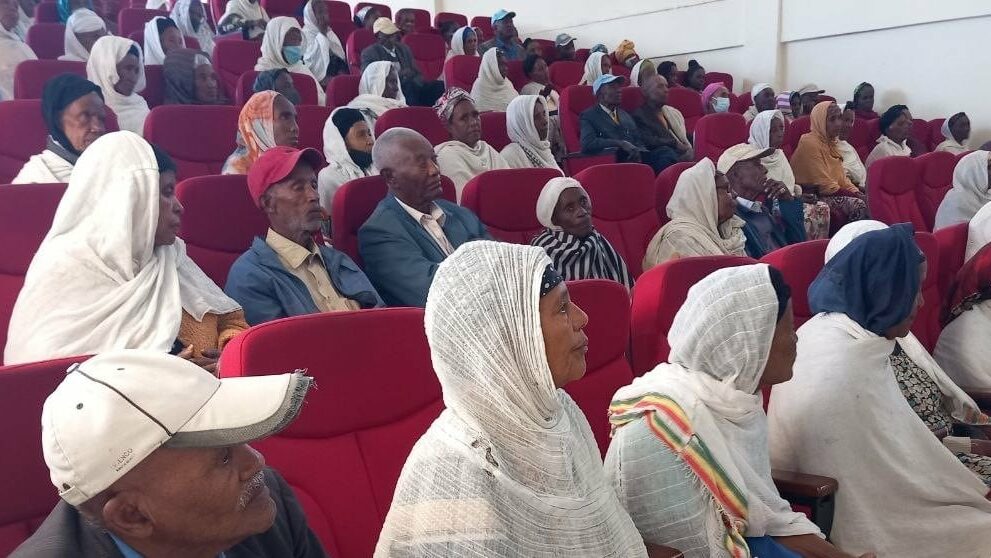Let’s not forget the rights of older people: seven ways to include them in your programme
Each year on the first of October, we celebrate the international day of older persons. This is an important international day for Dorcas, as we focus on supporting marginalised people and communities and older people are often marginalised and their rights neglected. They often have little income and limited access to health care and social security. In addition to that, they face discrimination and stigmatisation based on cultural norms and social prejudices, like ageism.
According to the United Nations, the number of people aged over 65 is expected to more than double from 761 million in 2021 to 1.6 billion in 2050. The number of people over 80 years old is projected to grow even faster. These numbers increase the urgency of taking the unique set of challenges older people face seriously. In this article we elaborate further on why older people require more of our attention and share some recommendations on how you can include them in your programme.

Lack of income and social protection
Dorcas has community safety nets programmes for older people in seven countries: Albania, Egypt, Ethiopia, Moldova, Romania, Tanzania and Ukraine. A main problem in these countries is that older people often have little income and that pensions are so low that they are hardly sufficient for covering their daily needs. Insufficient pensions put them in a much greater risk to external shocks as they have less margin to absorb these financially. In Ukraine for example, many older people who were already marginalised have been affected greatly by the ongoing conflict that led to a massive increase in inflation. Their already challenging socio-economic position has therefore become even more dire. Our local colleagues see that older people in Moldova will often accept poor paid jobs in order to survive. All in all, the lack of social protection causes many problems for older people in the countries Dorcas works in. This must become more of a priority for civil society organisations and government actors in the coming years, as the number of older people is rapidly increasing.
Loneliness and stigmas
Another major issue that older people face, is loneliness and isolation. In Albania, Moldova, Romania and Ukraine for example, many older people either have no family to support them or their families moved to the cities or abroad. In Egypt, local Dorcas colleagues have experienced that older people are also often neglected by their families. Next to the practical and financial needs, this is one of the most pressing issues. Loneliness greatly affects their well-being. Older people need connection, community and the opportunity to contribute.
Another reason why older people require our attention, is because of the challenging stigmas and prejudices they face. In Egypt, this is a major issue. There is a stigma that older people’s duty has ended, they are solely recipients of care and are no longer productive. Supporting older people and inviting them to participate in certain activities may therefor lead to opposition in certain contexts.

Seven ways to include older people in your program
Dorcas supports older people through our community safety nets programme. In this programme, the community plays a central role in making sure people have access to the support structures they need. There are different types of community safety nets, depending on the level on which actors are involved, and a mix of different types is needed to meet the different needs of older people.
One of the participants in this programme, is Moges from Ethiopia. Before joining the programme five years ago, Moges did not have the means to get enough to eat or pay for medical treatment. He would only eat one meal a day. His house was in very bad shape, as the back wall and roof of his house were falling apart. When Moges joined the Dorcas programme, his life has changed drastically. He is now able to eat three times a day, he gets medical treatment, his house was renovated, he actively participates in the programmes social gatherings and has made many new friends.

Dorcas supports older people by building a social safety net around them, so that the community increasingly looks after them. We encourage different groups in the community to use their resources to support and involve them in the community. We also advocate for the rights of older people among government actors and encourage to governments to improve the social security services.
Dorcas has seven recommendations for (I)NGO’s and other actors who are involved in contexts where older people are marginalised, in order to better protect their rights:
- Listen to the voices of all older people and acknowledge their wisdom, knowledge and experience. Provide accessible methods for them to participate in, make decisions about and provide feedback on the assistance provided to them. Ensure this input is incorporated into interventions.
- Ensure the provision of psychosocial support to older people, particularly those living alone. Support and engage older people in activities which help overcome their loneliness.
- Ensure that older people who have fled can access full basic services, including food and water, healthcare including mental health support, social services including pensions, transport and information.
- Prioritise collecting reliable data about numbers, needs and priorities of older people.
- Ensure that community, family or other support and protection networks and mechanisms for older people are restored and strengthened.
- Ensure that any funding provided for responses to crises caused by conflicts includes older people as a priority at-risk group, and that there is attention for sub-groups of the older population that face specific risks.
- Ensure that older people who have not been able to leave their homes, including those living in institutions, are reached, evacuated if they wish, provided with essential life-saving humanitarian support and tailored and prioritised assistance.
29 September 2023
Are you inspired?
Read the next story or contact us to get to know more about making an impact together.